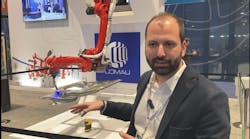We hit the trifecta these past 12 months. September 11. A tumbling stock market. A worldwide economic slowdown.
Amid the most unsettled economic times in many years, most of the major industrial machine-building market segments you work in took a terrible beating in sales revenue. It's a time we'll all be happy to see behind us.
Despite the stormy weather, control system designers in our machine building industries reported only a 2.3% drop in salaries over the past year in this year's salary survey results. And while many respondents noted business was down and layoffs were occurring all around them, job security actually inched up one percentage point.
The average salary reported was $66,139. While that was down $1,553 from last year's average, this year's response group reported a 3.2% pay increase (respondents differ year to year). There was a great deal of disparity among our machine building groups, with the average salary in industrial fans, blowers, and air purification equipment coming in at just $46,500 while $80,429 was the mean earned in semiconductor manufacturing machinery.
The form for this second annual survey was attached to the front of our April issue. It's notable that back then the Dow Jones Industrial Average was above 10,000, analysts were marveling about how the stock market was shaking off that little Enron mess, and WorldCom had issued a mere earnings warning. So, all in all, things were looking up back then.
This year we received 209 responses in time for tabulation. Many respondents provided comments, ranging from cynical: "There never was nor will there ever be such a thing as job security," says an electrical engineer working in the engines and turbines category--to stoic: "There have been at least two cuts in salaried and hourly employees and I was not impacted," notes a 54-60-year-old electrical engineer working in the chemical industry.
But How Are You Feeling?
We'll get back to the numbers in a minute. Let's talk a bit more how you feel,about your job, the security of that job, and of manufacturing in general?
"Since 9/11, the slowdown has worried upper management, thus causing concern down the line," writes a 37-45-year-old man in research and development at a Wisconsin pump manufacturer.
While the economy certainly was tottering before September 11 last year, many respondents cite that date and its events as the beginning of a slide that persists to today
"We observed a significant reduction in business after the 9/11/2001 terrorism incident. It was a like a door slammed shut for several months. All of our customers delayed whatever projects they could," Donald Donkervoet wrote in his survey form. He's president of Generation Technology Inc., a Dallas rebuilder of engines, turbines, and other large pieces of rotating equipment.
"The last quarter of 2001 and the first quarter of this year were pitifully poor,the worst I've seen in 12 years," he said in a follow-up interview. "We didn't lay anybody off, but we had to make work. A large service shop nearby laid off half their people. But in the past two months, we started seeing some business come back. No big pent-up demand, just a return to normalcy. We're not working any overtime yet, but we're optimistic."
"Our industry (industrial HVAC) relies heavily on commercial development. It will take at least a year, if the economy continues improving, for us to recover," writes a female electrical engineer in Indiana. "It could be ugly in the meantime, especially with all that dot-com office space sitting empty."
September 11 will affect some industries,and their suppliers,further down the road. "We design and build custom automated equipment for aerospace manufacturing," says Eric Nordin, a project engineer at Electroimpact Inc., a Mukilteo, Wash., machine tool builder. "It's a very cyclical industry. Right now we're very busy, but with the downturn in air travel and increasing fuel costs, which will undoubtedly affect the cost of air travel, I worry about what the future will hold for my company."
Some suspect that September 11 was an excuse for economic cuts by their employers. "There have been no raises and no new hires since September 11. I think that was an excuse, as I don't think our business was really affected," comments a 28-36-year-old electrical engineer at a western New York engineering and systems integration firm. A man at a New Jersey HVAC firm concurs: "Corporate HQ is using 9-11 as an excuse for a salary freeze."
As we said, economic woes predated the terrorist attacks. "Sales are down and have been for some time. Job security is low," writes a 28-36-year-old at a Maryland systems integration firm. "Salaried personnel have not received an increase in two years," concurs a 54-60-year-old mechanical engineer at a North Carolina maker of metalworking machinery.
"Twice a month we wait for pink slips," adds a 54-60-year-old Wisconsin man involved in system integration and material handling, earning $36,000-$40,000. "They're downsizing,the permanent layoff of people with more than 25 years of seniority, while retaining low-seniority employees. Less pay means less cost to company. They're also transferring work/jobs to lower-pay non-union plants (some of them new)."
His comments are symptomatic of two concerns voiced by others. One is the displacement of older workers by younger ones. However, the new guys are not always paid less. "I've been working for 12 years and college graduates in engineering are starting at the same salary that I'm making," writes a 28-36-year-old electrical engineer at a Washington instrumentation and controls company. He's earning $51,000-$55,000. "This is the third company I've been at where this situation has existed. It's a shame that several years of real-world training are not valued by management."
The Wisconsin man's other worry, the movement of manufacturing to lower-paying sites, concerns many others. "I'm fearful of the general trend to move manufacturing to other countries," writes a 37-45-year-old electrical engineer in a North Carolina printing machinery manufacturer.
"Manufacturing keeps declining in the U.S.," laments a middle-aged man at an Illinois machine tool builder. "More and more, manufacturing is moving to BCP,best cost producer sites,Mexico, Malaysia, China, Korea," agrees a Maryland man in engineering and system integration.
There's a palpable sense of fear out there. "Can we keep the doors open?" asks a fellow at a Nebraska pump maker. "This company may go out of business due to the economy," worries a man at a Michigan machine tool firm. "If business does not improve, we will probably have more layoffs," adds a 46-53-year-old male with a master's degree in electrical engineering who's making $81,000-$99,000. When asked how many people he supervises, he wrote in "none anymore."
All of which is leading to some serious pessimism. "There is no job security today!" exclaims a 54-60-year-old man in management at an Ohio engineering and systems integration firm. "Job security is always questionable,and I've already had too many jobs," offers a Florida engineer in packaging machinery.
One of the best quips comes from a man at an Indiana material handling firm: "Who wants job security in a place like this?"
Silver Linings?
The tough year notwithstanding, surveys like this tend to bring out the negative comments. For the great silent majority, it was business as usual: paychecks that didn't get any bigger, long hours, but an attitude towards their job that transcended the mercenary issues.
In fact, when asked to rate your level of job satisfaction on a four-point scale, this year's mean was identical to last year's: 2.18, just beneath the "fairly satisfied" mark. On a question about what provides the greatest sense of job satisfaction, the greatest number (38.5%) said it was challenging work, higher than salary and benefits (26.5%), and followed by company appreciation (18.1%), job security (8.0%), and advancement opportunity (6.6%).
And job security actually improved a tiny bit. Last year 41% of respondents said they were worried about losing their jobs; this year the number was 40%.
Despite the acrimony above, there were a couple of respondents who found positive things to say.
"A government project will carry us through next year, and new proposals are in the works," says a mechanical engineer at an Ohio material handling firm. "I'm considered a key employee. If you're good, you're secure," comments a man at a Texas maker of oil and gas field machinery.
Some industries seem to be faring pretty well. "The energy industry seems to be overall very stable," writes a West Virginia supplier of mining machinery. "My field [material handling & conveyors] is still in demand," adds a Maryland electrical engineer.
And then there are those who have an inside track. "Job security for me is relatively assured in that I own the company," says a Colorado mining machinery executive. "As chief engineer and operations manager, I'm pretty tight with the owner," boasts a mechanical engineer at a Wisconsin material handling firm. "No I'm not concerned about my job security because I am ready for retirement at any time," notes an eager over-61-year-old man at a California pump manufacturer.
What About the Benjamins?
All of our readership is involved in the design of control systems industrial original equipment manufacturing sector. While that job title does not always require an engineering degree, a great many of our readers are engineers. In fact, 58% of our respondents reported having engineering degrees, and another 7.6% are degreed in computer science or math and physics; 15% have other college degrees.
Electrical engineers comprise the biggest group (71), and they make $70,894, second only to the scant few chemical engineers ($96,300). All engineers but the industrial engineers make over the $66,139 survey average. Although only 10.5% of our respondents are licensed professional engineers, they command a hefty $83,250, nearly $20K more than everyone else.
Education definitely pays. Machine builders with just a high school degree are earning $54,000, there's a significant bump for those with a college degree ($61,473), and the category plateaus at a master's degree ($79,141). The few respondents with a doctorate did not earn any more money.
There also was an income plateau in a question about years with your current employer. Those with 6-10 years of seniority actually were at the low end of the salary spectrum, earning $59,806. Respondents who checked 0-2 and 2-5 years were earning $8,000 and $7,000 more, suggesting there may have been some job-jumping and maybe even a little talent shortage in the past couple of years. Those with 11-20 years earned more than that middle group, and the category peaked at $75,433 for the 21-25-year crowd, before dipping for those with more than 26 years on the job.
Another plateau occurred in hours worked. Putting in the extra time pays off, but only to a point. Those keeping it at or just under 40 hours take home $63,794, 41-50 hours pays $65,336, 51-60 hours jumps to $72,696, but more than 60 hours does no good for the small sample in this category, who earn $70,500.
Two categories where salary does not plateau are age and years involved with control systems. Cross-tabulations in each provided pretty constant stepped increases, with employees over age 61 earning an average of $79,462, and those with more than 30 years of control experience making $75,462.
Where you work counts. Those in the south central region, anchored by Texas (where the largest number of responses came from), were the only ones to average more than $80,000. Despite a slight dip over last year, the West Coast remains a high-pay area ($73,639), while the north central (just west of the Mississippi River) and mountain regions were at the bottom ($56,900 and $58,000 respectively).
Respondents were overwhelmingly male (98.5%) but there was less income disparity here than in similar surveys: Men earned $66,081 to the $59,667 brought in by the few female respondents.
Not surprisingly, company management is the highest-paying job category at $73,078, but that's lower than comparable salaries in other surveys and it's only $2,000 above employees in research and development. Those in engineering design average $66,786, tech support gets $52,441, and machine assembly brings in just $46,333.
But if your pay wasn't enough, you can always make up for it with a hefty bonus, right? Wrong, at least for the 58% of you who receive no such thing. The rest were pretty evenly divided among the four preselected categories that topped at $10,000, 3% got a dividend of $10,001-$20,000 and a precious few (1.4%) got more than $20,000. It's notable that, while the mean bonus was $2,022, the median was just $308.
For the few who got one, the basis for that bonus was cost reduction for 30% of you; 22% got one for finding new customers, and about 19% each for innovation and technical support.
Average hours worked inched up by only 18 minutes or so over last year, to stand at 45½ hours a week, although 2.4% claim they put in more than 60 hours.

Leaders relevant to this article:













